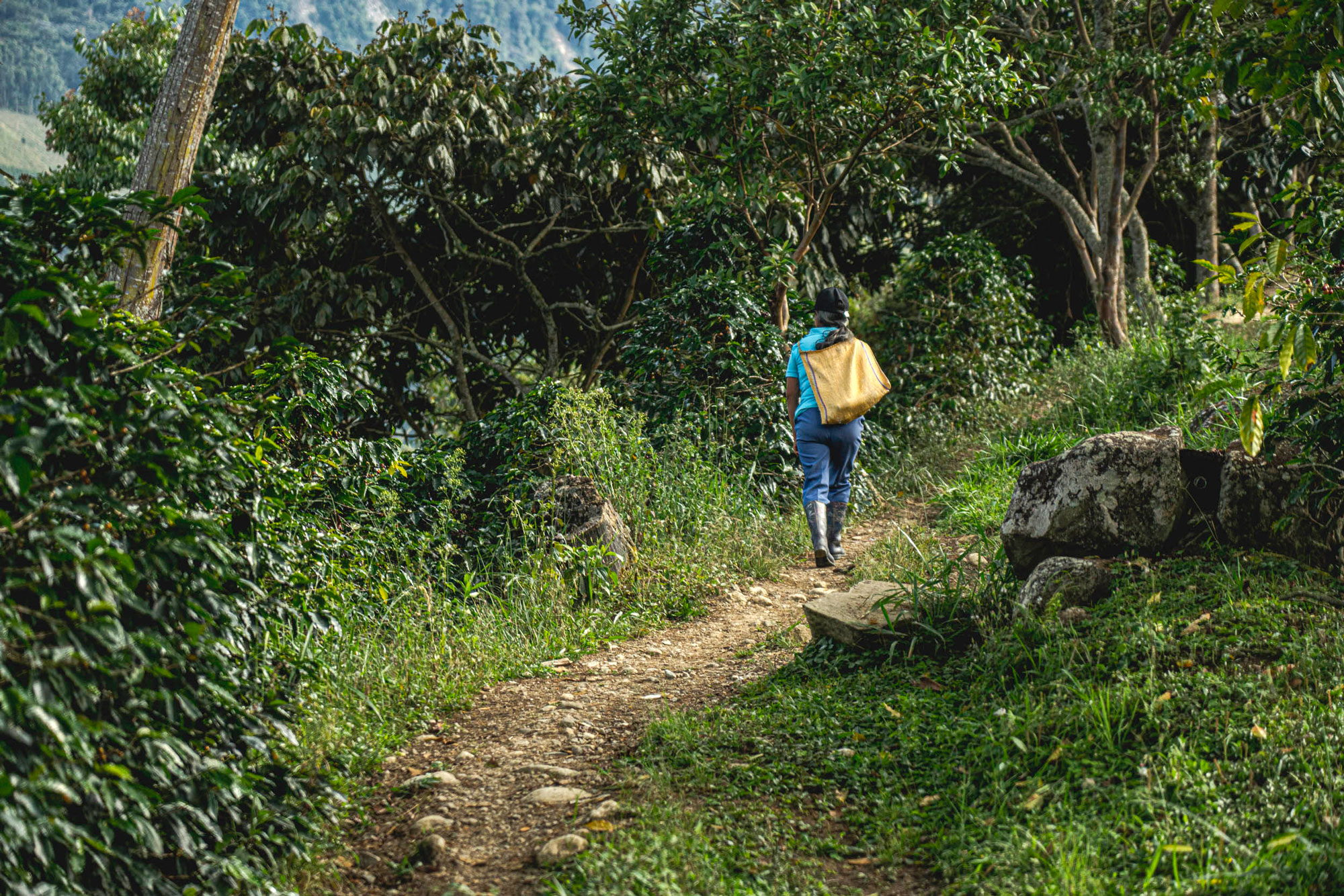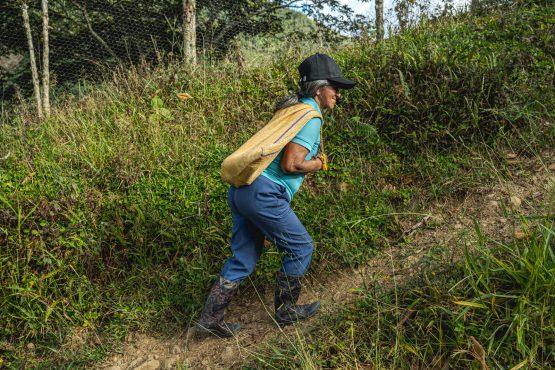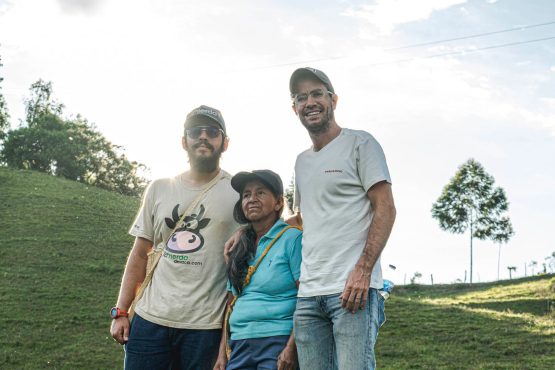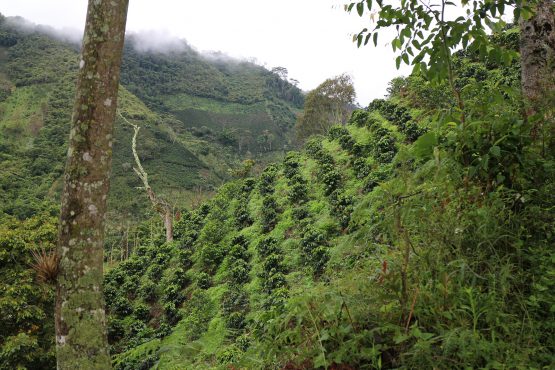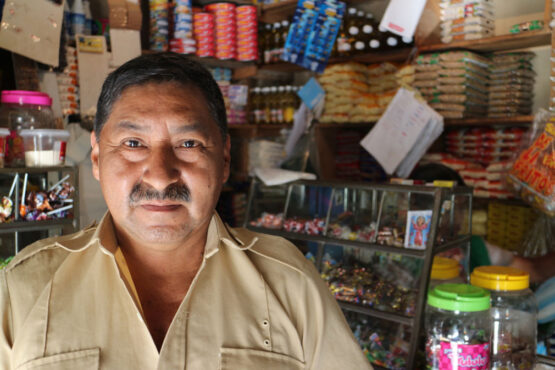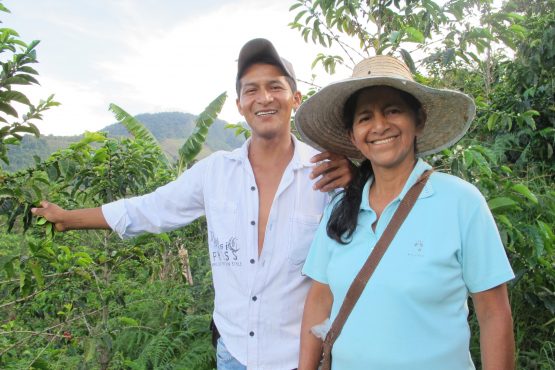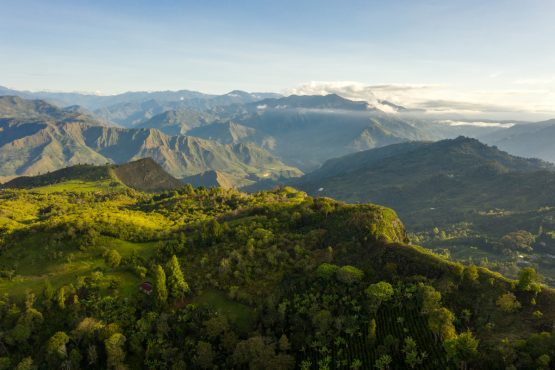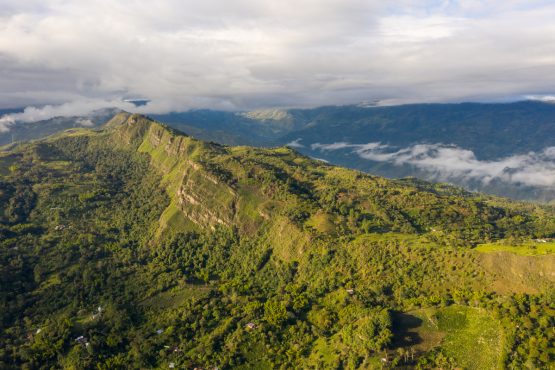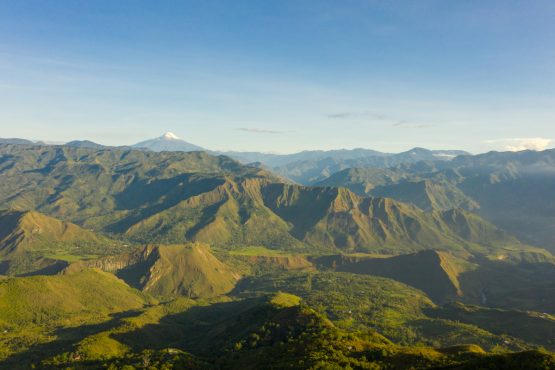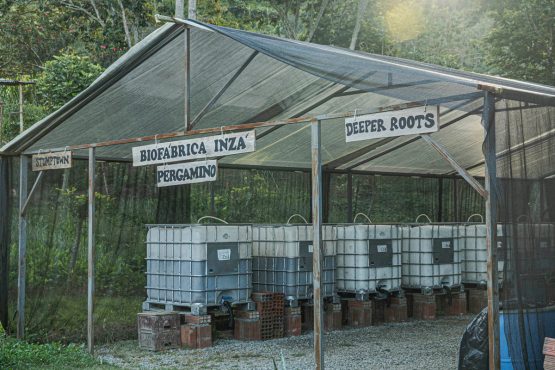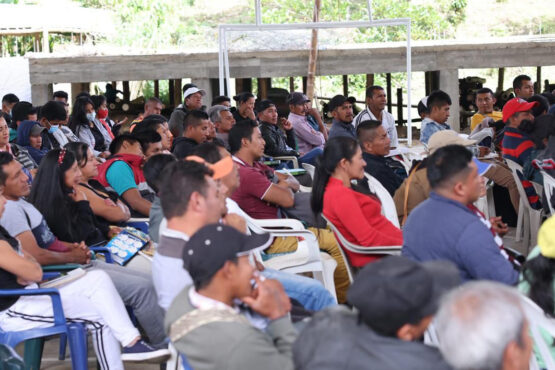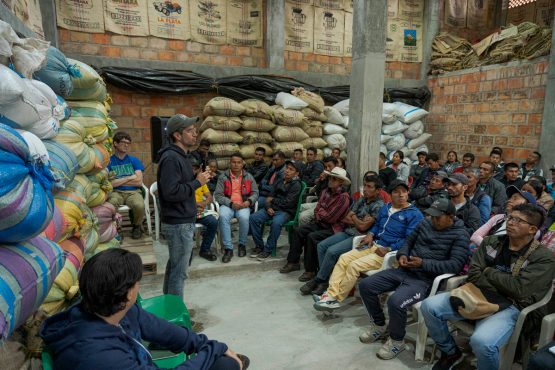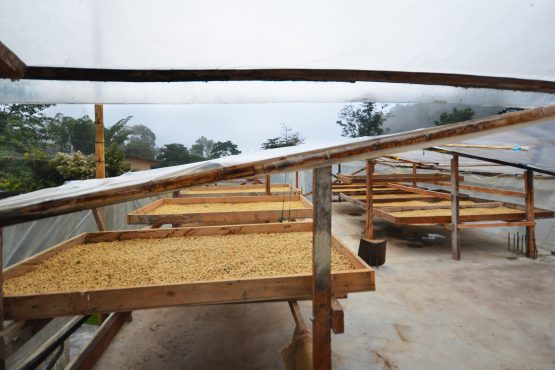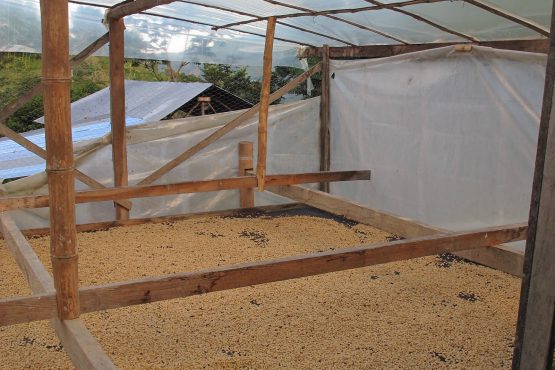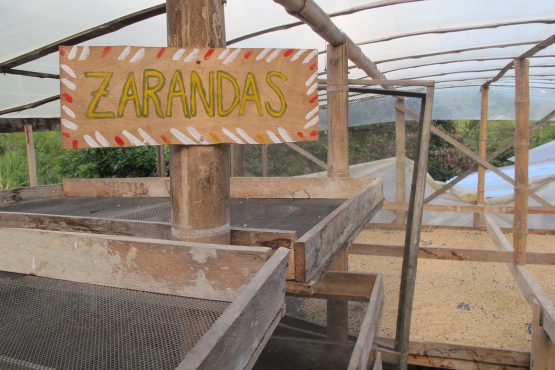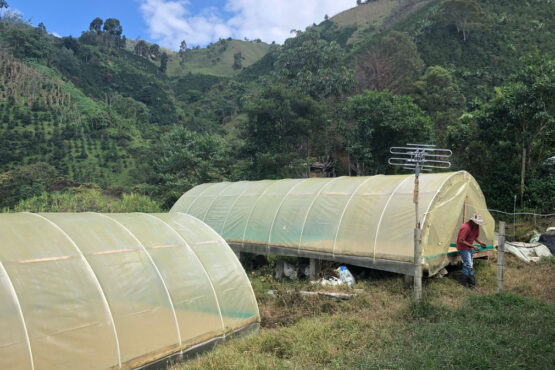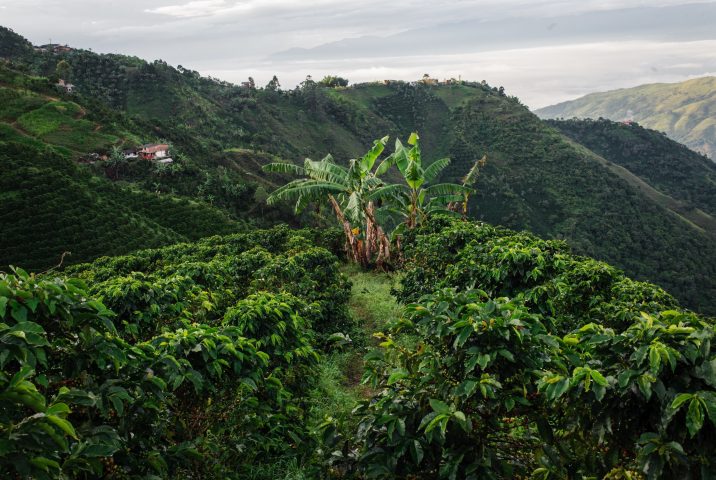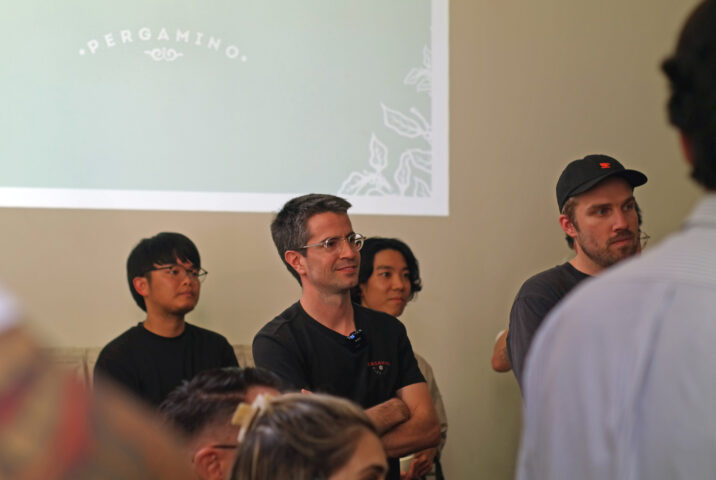Los Nogales
Soft and floral, with crisp, citric acidity. Mandarin, blackberry and green apple, with a lingering tea-rose fragrance.
Maria Rosa Oidor runs her farm, Los Nogales (or ‘the walnut trees‘ in Spanish’), with her husband Alfonso Pillimué and their four children. The farm is situated a thirty minute walk from the small town of San Antonio, where the couple also own a general store. Maria Rosa and Alfonso saved the money to buy their two-hectare farm some twenty years ago from the earnings they made from their shop.
Today, Maria Rosa’s entire family is dedicated entirely to coffee. Her two eldest sons, Neyid and Robinson, are well-regarded and respected coffee producers in their own right, with a passion for organic farming practices. Her youngest son, Nilson, has inherited part of the family farm and is working to learn more about coffee. Maria, now in her 60s, still takes a hike up the mountain every day to organise pickers and to schedule the day’s work. She is an impressive woman and an inspiration to many in the region.
Despite the small size of the farm, Maria and Alfonso had initially planted three different varieties on their land: Caturra, Typica, and Tabi. A few years ago, Maria made the tough decision to uproot her existing trees and renovate her farm, planting only Pink Bourbon, a variety with direct links to Ethiopia known for producing a floral and elegant cup. This offering is the second 100% Pink Bourbon lot we have sourced from Los Nogales. The high elevation of their farm (some 2,000 metres above sea level) makes it possible to continue growing this more disease-vulnerable variety, despite the dangers of coffee leaf rust. It also means the coffee cherries ripen more slowly, allowing a higher concentration of sugars to develop, resulting in a sweet and complex cup.
The coffee trees at Los Nogales are fertilised up to three times a year depending on the state and quantity of coffee on the tree, and seeds for new trees are collected and germinated on the farm itself. During the harvest, up to 15 workers help with picking and the family employs one permanent worker who maintains the crop throughout the year.
ABOUT THE PILLIMUÉ FAMILY
Maria Rosa and husband Alfonso are the heads of the influential Pillimué family, who work hand in hand with our supply partners, Pergamino, as their local logistical operators in San Antonio. The family has a longstanding presence in the area, having farmed coffee here across three generations. They also keep the town’s general store and have built an adjacent warehouse and QC lab, which acts as a receiving point for over 200 local producers who deliver coffee to them.
The Pillimues are determined to make a difference among the region’s coffee producers by supporting the local industry now and into the future. Maria Rosa and Alfonso’s grandson, Neyid Pillimue Jr, has recently joined Pergamino’s team as a trainee cupper and lab assistant at the family’s warehouse, demonstrating the Pillimue’s investment in the next generation of producers and coffee operators.
During the harvest, local farmers deliver small lots (around 100-150kg) of dried parchment to the Pillimué family’s warehouse and lab every 2-3 weeks. Upon delivery, a sample of the dried parchment is milled and assessed for physical attributes, including uniformity of size, presence of defects, moisture content and seed to hull ratio. If the coffee passes the physical assessment, it is accepted and the farmer receives their first payment for the coffee, calculated by the weight delivered and a base rate related to the physical quality of the parchment.
Samples of the coffees are then cupped by a team trained by Pergamino and, if selected, sent weekly to Pergamino’s QC lab in Medellín where they are further assessed by an expert team of cuppers. Each lot is carefully evaluated and, based on the cup score and profile, the coffee is sorted into different grades of quality and combined into exportable sized lots. Feedback on each lot is relayed back to the producer and after it has sold, a second payment is made to them according to the premium the coffee attracted.
ABOUT INZÁ
The municipality of Inzá is located in the corner Cauca state, bordering with Tolima and Huila and looking out to the west over the Pacific Ocean. This region has excellent conditions for growing high-quality coffee, with high elevations and rich volcanic soil. The plateau has a very stable climate year-round thanks to its proximity to the equator and the surrounding mountains, which protect the coffee against the humidity of the Pacific Ocean and the trade winds from the south. This region is an important source of water and wildlife for Colombia, in addition to being prime coffee-growing land.
Inzá is the traditional home of the Nasa (or Páez) people, one of Colombia’s largest indigenous groups. During the Spanish invasion of Colombia, many of the Nasa were able to avoid bloodshed by escaping to the rugged hills and high plateaus of the Andes Mountains, where the Spaniards were unable to pursue them. Today, the Nasa economy relies on agriculture, and society is organised into tight knit farming communities who distribute duties equitably under the guidance of cabildos, or locally elected councils. Like many indigenous groups across Latin America, the Nasa have spent decades lobbying for the return of their land rights, finding success in recent years. Their struggle has led to legal recognition of the fundamental rights of indigenous peoples, including recognition of the autonomy of their communal indigenous lands in the 1991 Colombian Constitution.
Coffee from Cauca has historically been very difficult to access due to the region’s isolation and instability. For many years this part of Colombia was under the control of Colombia’s notorious rebel group, the FARC, and as a result, it was unsafe and violent. Since 2012, safe access to this region has been possible as a result of peace talks between the national government and the rebels. Thanks to these efforts, more and more stunning coffees from small producers in the region have become accessible to international buyers.
Our export partners for this coffee, Pergamino, have worked hard commercialise specialty-grade coffee throughout Cauca, and are now able to source some outstanding coffees from very dedicated producers. They work closely with the producers to give them feedback on their coffees (provided by Pergamino’s expert team of cuppers) and provide top up payments when the coffee is sold at a higher premium.
Head here to learn more about the work of Pergamino.
HOW THIS COFFEE WAS PROCESSED
The coffee in this lot was selectively hand-harvested, with most labour being provided by Maria and her family. It was processed using the washed method at the farm’s ‘micro-beneficio’ (mill).
The coffee was pulped using a small manual or electric pulper and then placed into a fermentation tank without water, where it was fermented for 36 hours and then washed using clean water from nearby rivers and streams.
The coffee was then carefully dried (over 10–18 days) on raised beds and concrete patio, which are covered by a greenhouse-style canopy that acts to protect the coffee from the rain and prevent condensation dripping back onto the drying beans. The greenhouses are constructed out of plastic sheets and have adjustable walls to help with airflow, and temperature control to ensure the coffee can dry slowly and evenly.
Once dry, the coffee was delivered to Pergamino’s warehouse in Medellín, where it was cupped and graded. Once approved, coffee rested in parchment until it was ready for export.
